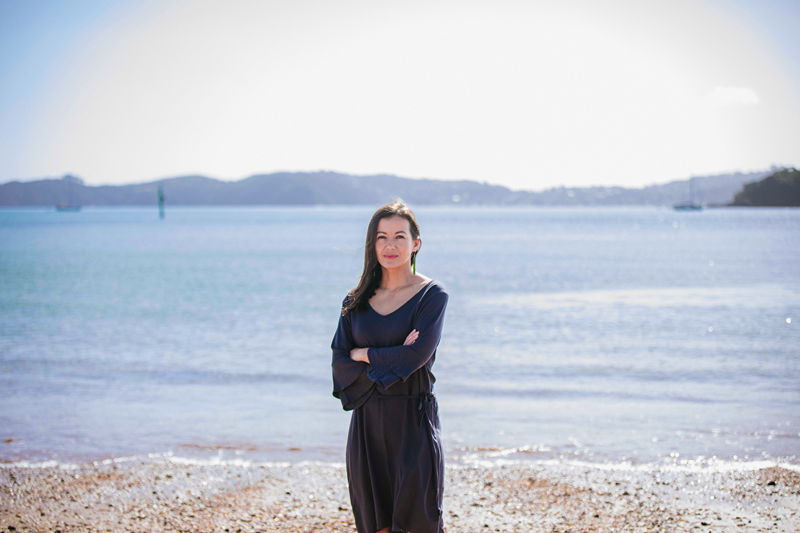 LanPham at Waitangi for her first Waitangi Day as a Green MP (photo credit Florence)
LanPham at Waitangi for her first Waitangi Day as a Green MP (photo credit Florence)
Lan Pham: navigating the currents of change
Lan Pham’s story began in Te Whanganui-a-Tara Wellington, a city renowned for its vibrant culture and political heartbeat. Born into a diverse heritage of Vietnamese and Pākehā (Irish, English) descent, Lan has crafted a life dedicated to service and advocacy. Her six-year tenure as a regional councillor for Environment Canterbury set the stage for her ascent into the national political arena, culminating in her election to New Zealand’s Parliament as a representative of the Green Party in the 2023 general election.
“I’m really proud to be the first MP of Vietnamese heritage, which is really cool.”
An academic foundation
Lan, a proud Massey University alumna, offers a rich blend of expertise – combining the insights of a freshwater ecologist with the strategic acumen of a politician. Lan’s academic odyssey at Massey laid the cornerstone of her lifelong dedication to environmental and political spheres. As a student, she delved into a world beyond her textbooks, where Aotearoa New Zealand’s history was unfolded before her. Arriving with a passion for ecology and an appreciation for the natural world, she found her path at Massey, where her love for animals and plants transcended into a deeper understanding of the delicate interplay between ecosystems and human society.
Lan’s reflections on her time at Massey underscore the transformative nature of education. As an inquisitive student, she developed a foundational awareness of New Zealand’s global role, historical context, and ecological dynamics. Lan describes her university experience as beginning to understand the interconnectedness of the environment, society, culture and economy. This holistic view would later become the bedrock of her political philosophy.
“What I learned at Massey about the ecology of being in the world,” Lan says, “is that everything is connected. You cannot silo out different aspects of our existence; they all converge.”
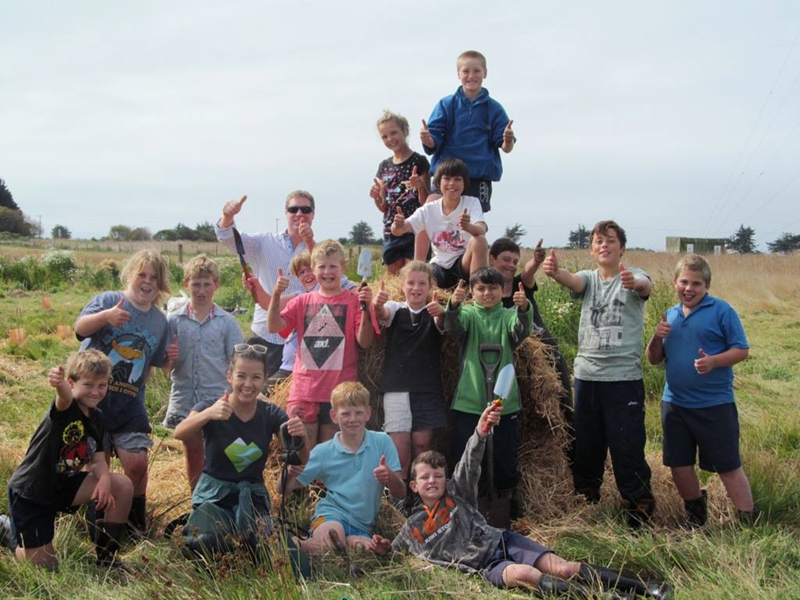 Kōwaro Canterbury Mudfish love swept St Andrews in South Canterbury with the local primary school teaming up with Working Waters Trust and a local landowner to protect and enhance critically endangered Kōwaro habitat. St Andrews Primary went on to win the Young New Zealanders award and was a joint winner of the overall conservation award for their work conserving and rehabilitating the habitat of the Canterbury Mudfish.
Kōwaro Canterbury Mudfish love swept St Andrews in South Canterbury with the local primary school teaming up with Working Waters Trust and a local landowner to protect and enhance critically endangered Kōwaro habitat. St Andrews Primary went on to win the Young New Zealanders award and was a joint winner of the overall conservation award for their work conserving and rehabilitating the habitat of the Canterbury Mudfish.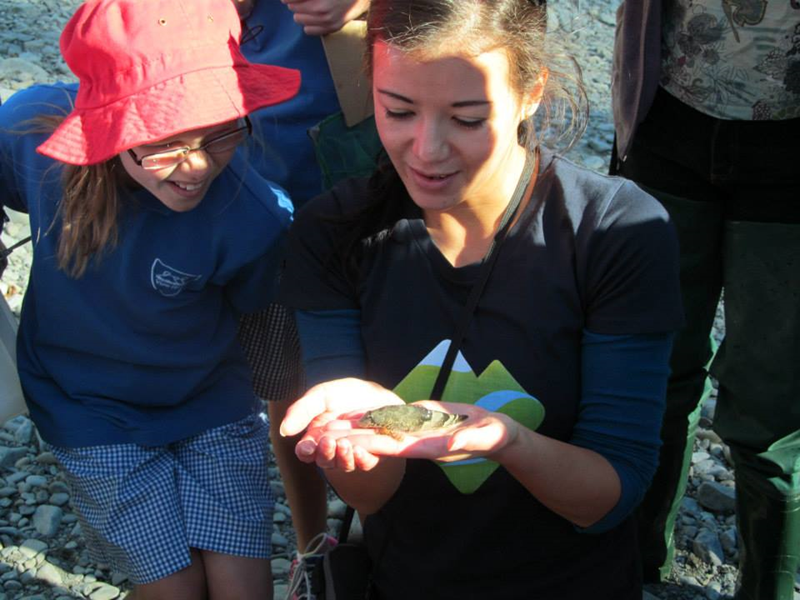 The wonders of Aotearoa’s native freshwater fish (in this case a native torrentfish) on display for students in North Otago as part of Working Waters Trust freshwater education programme that Lan founded and ran for a decade.
The wonders of Aotearoa’s native freshwater fish (in this case a native torrentfish) on display for students in North Otago as part of Working Waters Trust freshwater education programme that Lan founded and ran for a decade.
A journey of connection
This realisation became increasingly apparent after graduation, as she faced the practical world with her academic degree. Seeking to put theory into application, Lan moved to the South Island, driven by the Conservation Corps programme that promised hands-on experience in ecological conservation. This experience was pivotal, leading to an internship with the Department of Conservation’s freshwater team – a role that would define her career trajectory.
In the field, Lan’s expertise in freshwater ecology profoundly influenced her policy-making approach, emphasising the significance of evidence-based decision-making. This scientific foundation allowed her to address environmental issues with a pragmatic yet innovative mindset, ensuring policies were ideologically sound and grounded in empirical reality.
Her academic endeavours led her to the University of Otago, where she honed her expertise in Freshwater Ecology. It was here that Lan’s passion for the environment evolved into a concrete skill set, equipping her to make tangible changes in public service and grassroots conservation. She didn’t just study ecosystems – she engaged with them, collaborating with various groups from mana whenua and farmers to schools and community groups across Canterbury, Otago, and Southland.
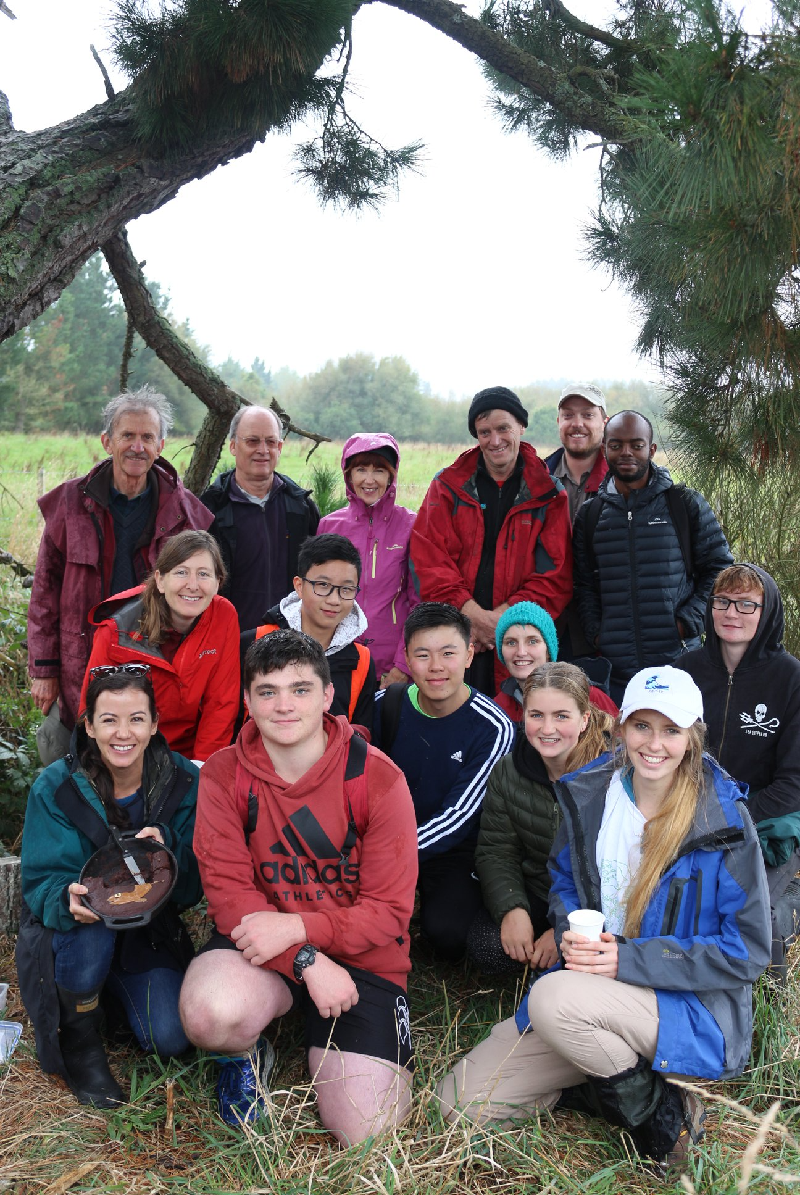 Celebrating the anniversary of one of Working Waters Trust’s Kōwaro Canterbury mudfish habitat restoration sites in Oxford North Canterbury with nothing less than chocolate mud cake. Pictured with volunteers from Forest and Bird Youth and the local Forest and Bird North Canterbury members.
Celebrating the anniversary of one of Working Waters Trust’s Kōwaro Canterbury mudfish habitat restoration sites in Oxford North Canterbury with nothing less than chocolate mud cake. Pictured with volunteers from Forest and Bird Youth and the local Forest and Bird North Canterbury members.
Engagement beyond academia
Lan recalls one of her most cherished initiatives post-university, the formation of the Working Waters Trust, which she co-founded with a group of friends. The trust focused on freshwater education and restoring habitats for New Zealand’s most endangered native fish species. One project, in partnership with St Andrews Primary School, showcased her integrative approach, blending conservation with community engagement. Students worked alongside landowners to create habitats for the Canterbury mudfish, also known as the Kōwaro, crafting a narrative of conservation that extended beyond academia into the community. The initiative led the St Andrews Primary School group to win the Young New Zealanders award at the Conservation Awards. Also, it was a joint winner of the overall conservation award at the Canterbury Aoraki Conservation Board evening for its work conserving and rehabilitating the habitat of the critically endagered Kōwaro, Canterbury Mudfish.
Lan’s passion for ecological and social well-being found a political outlet when she served two successful terms on Environment Canterbury (Regional Council for Waitaha Canterbury), making history with her candidacies in 2016 and 2019. Despite the logistical challenges of campaigning from the isolation of Rāngitahua Raoul Island, her voice resonated with the electorate, and she emerged as the highest-polling candidate in her constituency.
Among the milestones she holds dear from her time at Environment Canterbury are a series of ground-breaking initiatives: the council’s firm stance against deep-sea oil and gas drilling off the coast, leading the charge in Aotearoa to declare a ‘Climate emergency’, and the strategic passing of the Ngāi Tahu Bill. This particular legislation was a monumental stride toward more equitable representation, enabling the appointment of two Ngāi Tahu Councillors to the regional council.
Under Lan’s influence, the council also saw a substantial increase in biodiversity and biosecurity funding, a leap from 9 million to 36 million NZD within four years. Her environmental advocacy shone through in the public opposition to nitrate pollution as part of changes to the Land and Water Plan and the implementation of affordable bus fares in Greater Christchurch. Notably, she helped Environment Canterbury set a precedent as the first Regional Council in the country to become a certified Living Wage employer.
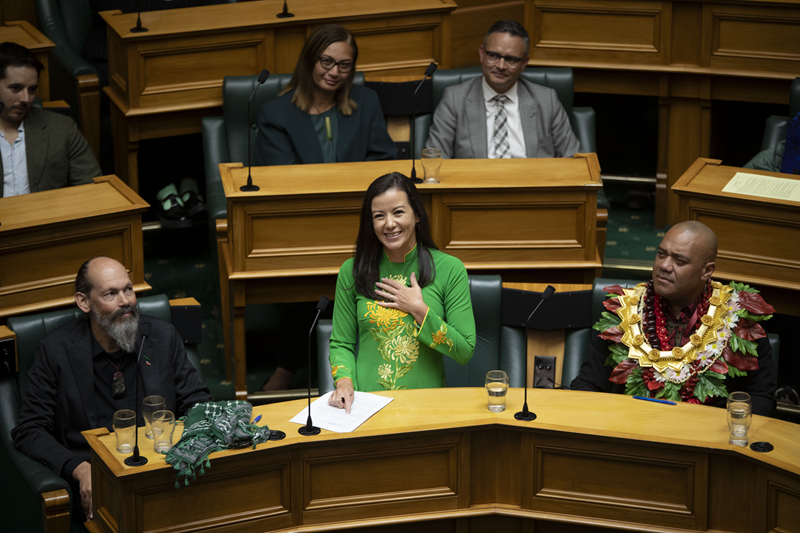 Maiden speech as the 1st Vietnamese MP in parliament in February 2024 (photo credit Tallulah Farrar)
Maiden speech as the 1st Vietnamese MP in parliament in February 2024 (photo credit Tallulah Farrar)
Advocacy for change
Throughout her career, Lan learned that systematic change is possible and necessary. She saw the resistance of existing ways as a challenge to overcome. “It’s all made up of decisions by leaders over time. We can change these systems by making better decisions,” she explains. Lan’s insights into the importance of community needs are rooted in reality. “Understanding issues on the ground is integral. “Parliament can seem like a tornado, but the decisions made there have very real community impacts – so connection to community should ground everything we do.”
Striking a balance between work and personal life has been an ongoing lesson for Lan, particularly as a mother of two. She credits her supportive husband, who’s taken on the full-time role at home, as crucial to her ability to serve in politics effectively. “It's all about making the most of our short time on this precious planet,” Lan shares.
When not engrossed in her work, Lan finds relaxation in walking and biking, which echo her connection to the environment.
To the students and future graduates, Lan imparts a message of engagement and authenticity: “Your voice is needed to create change. Be authentic, be real, and don’t sit on the side-lines of life. The world needs you.”